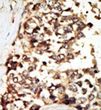Protein Kinase D2 (PRKD2) (C-term) Rabbit Polyclonal Antibody
Other products for "PRKD2"
Specifications
| Product Data | |
| Applications | IHC, WB |
| Recommended Dilution | ELISA: 1/1,000. Western blotting: 1/100-1/500. Immunohistochemistry on Paraffin Sections: 1/50-1/100. |
| Reactivities | Human |
| Host | Rabbit |
| Isotype | Ig |
| Clonality | Polyclonal |
| Immunogen | This PKC-D2 antibody is generated from rabbits immunized with a KLH conjugated synthetic peptide selected from the C-terminal region of Human PKD2. |
| Specificity | This antibody recognizes Protein Kinase D2 (PKD2). |
| Formulation | PBS with 0.09% (W/V) Sodium Azide as preservative. State: Purified State: Liquid purified IgG fraction. |
| Concentration | lot specific |
| Purification | Protein G Chromatography, eluted with high and low pH buffers and neutralized immediately, followed by dialysis against PBS. |
| Storage | Store the antibody undiluted at 2-8°C for one month or (in aliquots) at -20°C for longer. Avoid repeated freezing and thawing. |
| Stability | Shelf life: one year from despatch. |
| Gene Name | Homo sapiens protein kinase D2 (PRKD2), transcript variant 2 |
| Database Link | |
| Background | PKD2, a member of the polycystin family, functions as a calcium permeable cation channel. PKD1 and PKD2 may function through a common signaling pathway that is necessary for normal tubulogenesis. PKD2 interacts with PKD1, potentially through the C-terminal region. PKD1 requires the presence of PKD2 for stable expression. PKD2 also interacts with CD2AP. This protein is strongly expressed in ovary, fetal and adult kidney, testis, and small intestine, but is not detected in peripheral leukocytes. Defects in PKD2 are the cause of autosomal dominant polycystic kidney disease type II (ADPKD-2) which represent approximately 15% of cases of autosomal dominant polycystic kidney disease, a common autosomal dominant genetic disease affecting about 1 out 1000 individuals. ADPKD is characterized by progressive formation and enlargement of cysts in both kidneys, typically leading to end-stage renal disease in adult life. Cysts also occurs in the liver and other organs. All mutations, scattered between exons 1 and 11, result in a truncated PKD2 that lacks both the calcium-binding EF-hand domain and the two cytoplasmic domains required for the interaction of PKD2 with PKD1 and with itself. ADPKD type II is clinically milder than ADPKD type I, but it has a deleterious impact on overall life expectancy. |
| Synonyms | PKC-D2, nPKC-D2, HSPC187 |
| Reference Data | |
| Protein Families | Druggable Genome, Protein Kinase |
Documents
| Product Manuals |
| FAQs |
{0} Product Review(s)
0 Product Review(s)
Submit review
Be the first one to submit a review
Product Citations
*Delivery time may vary from web posted schedule. Occasional delays may occur due to unforeseen
complexities in the preparation of your product. International customers may expect an additional 1-2 weeks
in shipping.






























































































































































































































































 Germany
Germany
 Japan
Japan
 United Kingdom
United Kingdom
 China
China




